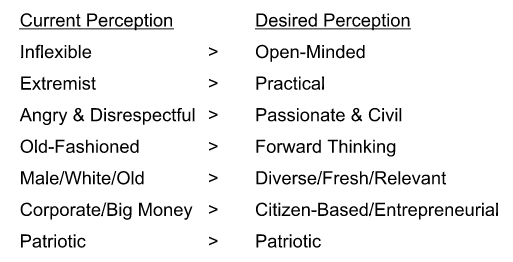Since presidential candidates spend small fortunes on political consultants, now might be a good time for the GOP to call in Don Draper.
Looking at the party in marketing terms, how would you describe its established brand? What words best represent our values and culture? When we look in the mirror, do today's stereotypical Republican characteristics jell with our own self-images as citizens? And if not, what would our preferred identity be? Here's my breakdown.
In examining the current assessment of the GOP versus a more preferred impression, notice just how much the words and language we use affect our internal and external dialogue and how just shifting those terms can alter the way we feel and think. I once heard a motivational speaker say, change the way you look at things and the things you look at change.
Now, for conservative GOP leaders to move across this spectrum may seem like a tectonic shift and for the extremist wing, more like unfathomable. Yet if more "moderate" Republicans would just look back at some of the party's fundamental principles, they might question the strategies and dynamics that have led the GOP brand so far astray from our desired perception. But first, we must re-label ourselves as "practical" Republicans, because moderate implies we don't really have our own positions, but instead simply seek the middle ground between others. That means we need sensible leaders (even just one) who can offer rational, forward-thinking ideas and plans to build and expand our customer base.
The idea here isn't to go back in time and turn Republicanism into a kind of Norman Rockwell painting, but instead, to refine and reshape some of these core values to fit the modern world, and to help reconstruct the way we perceive ourselves and act as Republicans. This is a candid examination of where we are now and where we want to go.
"Brand is just a perception," states business magnate, Elon Musk, "and perception will match reality over time. Sometimes, it will be ahead, other times it will be behind. But brand is simply a collective impression some have about a product."
However, we can't expect Republican leaders to move closer to our desired characteristics without public demand and pressure. Concerned citizens need to get involved -- we aren't bound by the same concerns and restrictions as politicians, such as having to cover your back within your own party or being in debt to private or corporate special interest groups. Freedom of choice is our greatest strength in getting things done in Washington. To quote Abraham Lincoln, "Our government rests in public opinion. Whoever can change public opinion, can change the government."
Too many Americans have also gotten out of the habit of being active participants in the political process. Dropping out of the conversation, simply voting the party line without studying the issues, or not voting at all. The fact is being an American comes with responsibilities. On the issue of voter apathy, I agree with Ronald Reagan -- freedom isn't free.
People shouldn't brag that they don't get "involved" in politics, as if that makes them pure and unspoiled. What it really means is that you're not living up to the duty that comes with the privilege of living in the greatest republic on earth. Politicians and government officials who are lying or cheating would have a much harder time of getting away with it if so many citizens didn't act as if there was an inherent right to be ignorant about the issues, abstain from the electoral process and complain from the sidelines.
There is nothing I would be more ashamed of as an American than not voting. In Australia, federal law actually requires citizens to register and vote. After each election, apparent non-voters are sent a letter requesting that they either provide a valid and sufficient reason for failing to vote or pay a $20 penalty.
According to the US Census Bureau, there are 206 million Americans eligible to vote and 146 million registered voters. If we were to apply Australia's rules to the 2014 midterm elections, where just 36 percent of eligible voters went to the polls, the government would be owed $1.2 billion dollars from 60 million non-voters. If we added in the unregistered voters (60 million), the total is over $2.4 billion dollars. Using this same formula for the 2012 national election (129 million voters), registered and non-registered voters would owe over $1.5 billion dollars. Wouldn't this be a unique approach to begin to address campaign finance reform? While mandatory voting seems somewhat un-American, it would be fascinating to have some civil debate on what it means to participate in a democracy today.
Meanwhile, to have a voice in the party's future and take part in the national conversation, GOP supporters who might have once described themselves as moderate Republicans (there are more of us out there than people think) and now feel disillusioned and disenfranchised, can reshape an unfavorable perception of the GOP by defining themselves as pragmatists..
Pragmatism: a reasonable and logical way of doing things or thinking about problems that is based on dealing with specific situation instead of on ideas and theories.
A practical or pragmatic Republican doesn't give up his or her principles, but instead, is guided by reason and logic, which may apply differently to each unique issue or situation. Flexibility, commonsense and compromise are political tools of power, not signs of weakness. That rational, reasonable thinking is what's missing from the GOP sales pitch -- somehow, we've become the party's less valued customers and our purchasing power has diminished.
In commercial terms, in order to improve the Republican brand and move our product, we must stop appearing as Mad (at everything) Men and start selling ourselves as a new and improved GOP that embraces pragmatism over the contemporary model of conservatism, which doesn't match up to its own founding principles. Plus, the competition is offering real-world, concrete proposals that speak to more levelheaded voters and we must also take into account that the country's demographics will shift dramatically over the next 20 years.
The Republican Party has to recognize that we're not matching our desired perception. Unless a brand transformation begins during the presidential campaign, we risk having a shelf life that expires in November 2016.


